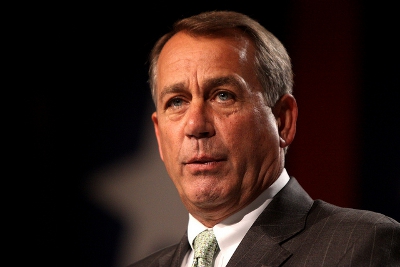USApp Managing Editor, Chris Gilson looks at the best in political blogging from around the Beltway. Our round-up of state blogs will follow on Saturday afternoon.
President Obama, the Democratic Party, and the GOP
On Sunday this week, The Daily Signal writes that President Obama has returned to the rhetoric of the last President, George W. Bush in his response to the challenge posed by the Islamic State in Iraq and Syria (ISIS). They say that while Obama’s talk of an open-ended conflict is like that of Bush, his lack of a commitment to putting ‘boots on the ground’ is more characteristic of Obama’s previous tactics of suppressing threats rather than meeting them head on. Meanwhile, PoliticusUSA writes that ahead of the midterm elections, President Obama needs to stop explaining his actions over ISIS and instead focus on issues at home and taking Republicans to task. They say that accusations from media pundits that Obama is now like Bush (simply because they share an involvement in the Middle East) are depressing the Democratic base, which may lead to lower turnout.
On Monday this week, the Monkey Cage looks at why the Republican Party has a dearth of female candidates, given that they only compose 8 percent of their House caucus, compared to 29 percent of the Democrat’s. They say fewer women are in the GOP’s pool of candidates, and that women have a harder time getting elected. The American Prospect looks at an ad out this week from the GOP which tries to convince women to vote for Republican gubernatorial candidates by presenting them as favorable wedding dresses. They say that the Republican Party’s attempt at a takeoff of reality shows such as Say Yes to the Dress just ends up being ‘pretty condescending’ towards women.
Moving on to potential Republican Presidential candidates in 2016, National Journal writes this week that Senator Ted Cruz (TX) looks to be preparing for a foreign policy focused campaign. They say that Cruz is crafting a foreign policy portfolio that will be designed to draw sharp contrasts to those of his Democratic and Republican opponents. Daily Kos responds to the recent talk of a potential Cruz candidacy by saying that if it is not ‘for real’, then it is the cruelest tease in political history, given how easy it would be for Democrats to target him in 2016. Senator Rand Paul of Kentucky is another Republican tipped to contest the GOP’s 2016 presidential nomination. The Atlantic wonders on Monday how Paul will ‘square the circle’ of his past political beliefs with his current ones, in light of his seeming change of heart over the U.S. campaign against ISIS.
This week speculation intensified about the presidential ambitions of Jeb Bush, after his brother, former President George W. Bush stated this week that he thinks that he wants to be president, according to Outside the Beltway. They say that the 2016 race is likely to see fragmented support for the party’s Tea Party wing and an open field for a centrist like Jeb Bush. On Wednesday, Perrspectives is far less enthusiastic about a potential comeback for 2012 GOP candidate, Mitt Romney. They say that voters just aren’t into him, and as election day gets closer, fewer Americans will like him.
The Midterm elections
This week marked one year since the U.S. government shutdown began, because of a Congressional dispute over the funding of Obamacare. Roll Call’s Hawkings Here writes that while last year most believed that the Republicans would pay the price in this year’s midterm elections, it has now all but disappeared as a campaign issue. They put it down to the public’s short attention span, and the fact that the shutdown crisis seemed to do little harm to most people.
With only a month to go before the election, speculation continues as to how successful the Republican Party is likely to be. Outside the Beltway writes that the GOP is likely to hold onto the House and see their majority increase to their largest since the days of Harry Truman. While the Republican Party is certainly ahead as far as the House is concerned, the Democrats’ House candidates have a distinct fundraising advantage, according to the National Journal. They say that in the most competitive contests, the average Democrat has brought in $179,300 in donations under $200, and the average Republican, $78,535. Daily Kos writes on Wednesday that while people are getting frustrated with being bombarded with requests for money from the Democratic Party, the fundraising appeals are the price for building a ‘people-powered Democratic Party’, as opposed to being funded by Wall Street as the GOP is.
On Thursday, Sabato’s Crystal Ball looks at the Senate election, writing that the chances of a Republican takeover are increasing, with Iowa and Colorado shifting from towards the GOP and a toss-up, respectively. RedState says that given the GOP only need to pick up six Senate seats to make the magic 51, the fact that Arkansas, Louisiana, Montana, South Dakota, West Virginia and Alaska are very likely to be Republican wins makes the Democrats’ loss of the Senate inevitable.
Government, the Beltway and Congress’ agenda

On Sunday, The Daily Signal reports that Republican House Speaker, John Boehner, has called for the use of U.S. ground troops against the forces of ISIS, despite the fact that President Obama has ruled out their use. Meanwhile, Informed Comment bemoans the fact that Congress has no problem with the fact that the war against ISIS may cost up to $22 billion, in the same year that it cut $8.7 billion in food stamp aid which acts a safety net for the working poor. This week the Brennan Center for Justice called on Congress to Pass the USA Freedom Act that was introduced in July by Senator Patrick Leahy (D-VT). They say that the Act will rein in the mass surveillance practiced by U.S. intelligence agencies, and that it has been put aside because of the perceived threat posed by ISIS.
Late last week Attorney General Eric Holder announced that he would resign as soon as his replacement was found. Wonkblog writes on the difficulties in finding a replacement for Holder, given that if the GOP wins the Senate in November, they will have a difficult task getting them confirmed, and if they push a successor through during the lame-duck session before the new Congress sits next year, they may face accusations that the confirmation was illegitimate.
This week saw the resignation of the director of the Secret Service, Julia Pierson, after it came to light that the recent White House intruder got much further into the White House than was previously known, and that an armed contractor with a history of violence had been allowed to ride an elevator with the President during his visit to the Centre for Disease Control. The Atlantic writes that it has been surprising that there has been no partisan sniping over the security breaches, and that presidential safety may be more important than simple politics.
On Thursday, PoliticusUSA reports that the Supreme Court has decided to hear election law cases from Arizona and North Carolina, which concern how redistricting occurs, and same day and out of district voting rules. They say that these cases mean that the Supreme Court will decide on what ‘free and fair’ elections actually mean.
Most politicians are keen to improve their dialogue with constituents. Roll Call offers this piece of advice this week: write better.
Foreign policy, defense and trade
U.S. airstrikes against ISIS forces in Iraq and Syria continued to dominate the political blogosphere this week. On Saturday, The Daily Signal says that Obama wants to stop the use of Tomahawk cruise missiles by the military by 2016, despite the fact that they are being used in the current action against ISIS. Meanwhile, The Lonely Conservative writes that in an interview this week, President Obama blames the intelligence community for underestimating ISIS, though a senior Pentagon official has stated that Obama was briefed on the threat posed by jihadists in Syria and Iraq, meaning that he must have chosen to ignore the warnings.
Hit & Run writes this week on a new poll that shows that a majority of Americans believe that the U.S. will end up using combat troops to combat ISIS in Iraq. They say that most people do not believe President Obama’s promises not to drag the U.S. into another war in Iraq, especially after the mission has already expanded since it was first described as a humanitarian one in August. Meanwhile, Crooks & Liars says that Republicans are happy to ‘send other people’s kids to war’, after the former Attorney General of Virginia, Ken Cuccinelli admonished President Obama for being apprehensive for using the word ‘war’ when describing the U.S. counterterrorism strategy.
Moving away from the Middle East, The Feed wonders this week if the U.S. will begin a pivot toward India, as that country’s President, Narendra Modi visits the U.S. and spoke at the United Nations’ General Assembly. They say that India’s big strategic interests of fighting terrorism and promoting the emergence of a peaceful and prosperous Asia not dominated by China are aligned closely with U.S. priorities. Staying in Asia, on Wednesday, Outside the Beltway writes that the U.S. should stay quiet about the pro-democracy protests now occurring in Hong Kong, given that the U.S. has limited power to persuade regimes to change their behavior.
Obamacare and health policy

This week also marked the first anniversary of the President’s signature healthcare reform, the Affordable Care Act (‘Obamacare’) coming into force. Daily Kos writes on seven ways that Obamacare is working, including large drops in the uninsured rate, and that many people getting health insurance at much lower cost. The Feed takes a more negative view, writing that after one year, there is still no consensus on how to fix Obamacare. They write that though health care costs are still too high, there is no consensus on how much Obamacare has addressed the problem, and what more can be done. Wonkblog reports this week that the Department of Health and Human Services (HSS) is removing immigrants from Obamacare coverage without warning. They say that 115,000 people are expected to lose coverage they purchased through the federal exchanges because they failed to provide documentation to prove that they are U.S. citizens, or that they are legally present in the country. They say that the HHS warnings were only provided in English and Spanish, which excludes many who are from Asian and Pacific Islander communities.
Red State writes on Wednesday that only five weeks out from the midterm elections, Republicans are not campaigning against Obamacare, despite the fact that the program polls negatively. They say that if the GOP won’t fight against Obamacare, then people should not vote for them.
On Thursday, PoliticusUSA writes on what they say is a warning about what may happen if Medicare, Medicaid, and Social Security are privatized. They say that in 2013, Kansas GOP Governor Sam Brownback, transferred the state’s Medicaid program into private companies, and that this has led to drastic cutbacks in care, and near bankruptcy for the state.
The economy and society
On Sunday, Informed Comment writes that a recent review of U.S. Department of Labour investigations has shown that oil and gas workers are being routinely underpaid by their employers and that through creative accounting they are being denied benefits such as medical leave or unemployment insurance. They say that as of August this year, the Department of Labour’s investigations have found that over 9,100 workers were owed more than $13 million in back wages. Fair wages or not, the U.S. petroleum sector is booming. The Feed writes this week that because of fracking and similar techniques, the U.S. is about to dethrone Saudi Arabia in terms of liquid petroleum production, which is set to reach 11.5 million barrels a day.
This week The Daily Signal looks at the war on poverty. They say that the country has spent $22 trillion since 1964 on the campaign, but the poverty rate of 14.5 percent is almost exactly what it was in 1967. They say that this lack of movement in the poverty rate is down to the Census Bureau not counting welfare payments as income, and the fact that many poor people are surprisingly well off. On Monday, Wonkblog looks at another national embarrassment – the U.S, infant mortality rate, which is ranked higher than 27 other wealthy countries. They say that a baby born is three times as likely to die in their first year as one born in Finland or Japan. They say that much of the difference lies in how extremely premature births are reported, and that babies born to poor mother are more likely to die in their first year than those born to the wealthy.
Can you be fired for running for political office? This week The Volokh Conspiracy looks at that question after a Florida woman, Viviana Janer, who was campaigning for Count Commissioner was fired by her employer Marriott Vacations Worldwide. They say that while there is no constitutional or common-law rule barring a private employer from taking such an action, 17 states have concluded by statute that employers may not bar employees from running for office, or fire them for doing so.
And finally…
The Daily Signal writes that four chickens could sway Iowa’s Senate race after it came to light that Democrat, Bruce Braley, may have sued his neighbor over chickens that had wandered onto his lawn.
Crooks & Liars reports on a Louisiana restaurant that is giving its customers a ten percent discount if they bring their gun to dinner.
Featured image: A U.S. Secret Service agent waits to open the motorcade door as President Barack Obama arrives at the Uptown Theater in Kansas City, Mo., July 30, 2014. (Official White House Photo by Amanda Lucidon)
Please read our comments policy before commenting.
Note: This article gives the views of the author, and not the position of USApp– American Politics and Policy, nor of the London School of Economics.
Shortened URL for this post: http://bit.ly/1uHhe6B






